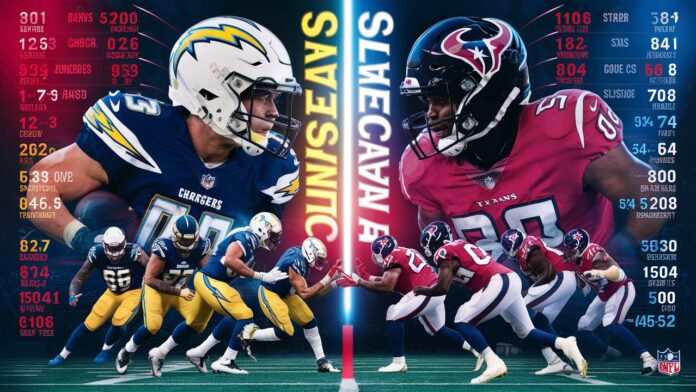The Houston Texans’ 32-12 victory over the Los Angeles Chargers in the 2025 AFC Wild Card game was a masterclass in defensive execution and offensive resilience. While the final score suggests a lopsided affair, the game turned on pivotal individual performances and catastrophic mistakes. This deep dive into the player stats reveals how Houston flipped a 6-0 deficit into a 20-point playoff rout, ending the Chargers’ season and advancing to the divisional round 16.
Quarterback Duel: Stroud’s Poise vs Herbert’s Meltdown
C.J. Stroud (Texans): Despite early struggles (including a fumbled snap and a red-zone interception), Stroud engineered a season-defining 99-yard touchdown drive before halftime. His 34-yard bullet to Xavier Hutchinson and 37-yard strike to Nico Collins showcased elite arm talent under pressure. He finished 22/33 for 282 yards, 1 TD, and 1 INT, with a critical 87.7 passer rating. His mobility (6 carries, 42 yards) extended drives, including a 4th-and-1 conversion that sealed the game 567.
Justin Herbert (Chargers): Herbert’s nightmare included 4 interceptions—doubling his regular-season total (3)—and a career-worst 46.6 passer rating. Though he connected with Ladd McConkey for an 86-yard TD, Houston’s defense harassed him into inaccuracy (14/32 completions, 43.8%). The Texans pressured him on 52.8% of dropbacks, resulting in 4 sacks and 9 QB hits. His third-quarter pick-six to Eric Murray was the definitive collapse moment 267.
Running Backs: Mixon’s Redemption vs Chargers’ Ground Game Void
Joe Mixon (Texans): Mixon’s fumble in the third quarter (his first in 1,082 touches) threatened to derail Houston’s momentum, but he rebounded with brutal efficiency. His 106 rushing yards on 25 carries included 91 second-half yards and a 17-yard TD dash to ice the game. He consistently evaded penetration, averaging 4.2 yards per carry and draining the clock late 67.
Chargers’ Backfield: J.K. Dobbins and Gus Edwards were non-factors, combining for 12 carries and 37 yards (3.1 avg). Houston’s defensive front, led by Will Anderson Jr. and Denico Autry, stuffed early runs, forcing Los Angeles into one-dimensional play. Dobbins’ longest run was just 8 yards 36.
Wide Receivers: Collins’ Record Day vs McConkey’s Lone Bright Spot
Nico Collins (Texans): The breakout star shattered franchise playoff records with 7 catches for 122 yards and a TD. His 13-yard score before halftime gave Houston its first lead, and his 37-yard reception on the 99-yard drive exemplified his chemistry with Stroud. He consistently beat All-Pro cornerback Derek Stingley Jr. in practice-style matchups 367.
Ladd McConkey (Chargers): The rookie was Herbert’s sole reliable weapon, grabbing 9 of 14 targets for 197 yards and an 86-yard TD. His acceleration after the catch torched Houston’s secondary on the Chargers’ only touchdown. However, his efforts were overshadowed by teammates’ drops, including Quentin Johnston’s 0 catches on 5 targets 367.
Defensive Standouts: Texans’ Takeover Artists
- Derek Stingley Jr.: The All-Pro cornerback dominated with 2 interceptions and 5 tackles, including a 54-yard return that set up a field goal. His blanket coverage forced Herbert into errant throws 37.
- Eric Murray: His 38-yard pick-six in the third quarter swung momentum decisively. He added 7 tackles and a team-high 89.9 PFF grade 26.
- Pass Rush: Will Anderson Jr. (1.5 sacks, 3 QB hits) and Mario Edwards Jr. (1.5 sacks) overwhelmed the Chargers’ O-line, while Khalil Mack (2 sacks) was Los Angeles’ lone defensive bright spot 36.
Game-Changing Moments: Stats Tell the Story
- 99-Yard Drive (2nd Qtr): Stroud’s 5:17, 13-play march—fueled by Collins’ 122 receiving yards—flipped the script from 6-0 down to 7-6 up 25.
- Murray’s Pick-Six (3rd Qtr): Herbert’s high pass to McConkey became a 38-yard INT return TD, extending Houston’s lead to 20-6 25.
- Blocked PAT Return (4th Qtr): After McConkey’s TD, Cameron Dicker’s blocked extra point was scooped by D’Angelo Ross for a rare defensive 2-point conversion, making it 25-12 56.
- Mixon’s Clinching TD (4th Qtr): His 17-yard rush capped a 14-play, 74-yard drive that burned 6:56 37.
Why the Texans Won: By the Numbers
- Turnover Battle: Houston’s 4 interceptions vs. Los Angeles’ 3 takeaways (+1 margin) 16.
- Possession Dominance: 34:25 time of possession allowed 70 offensive plays to the Chargers’ 54 13.
- Balance: 168 rushing yards complemented 261 passing yards, controlling the game’s tempo 36.
Conclusion: Implications for Both Teams
The Texans advanced to the divisional round behind a defensive masterpiece and Stroud’s clutch gene. For the Chargers, Herbert’s regression and receiver limitations (beyond McConkey) demand urgent offseason fixes. Houston’s blueprint—opportunistic defense, Mixon’s clock-chewing, and Collins’ explosiveness—makes them a live underdog moving forward 67.
FAQs: Key Stats and Performances
Q1: Why did Justin Herbert struggle so much?
Herbert faced pressure on 52.8% of dropbacks, and receivers dropped 5 passes. His 4 INTs were a product of rushed throws and tight coverage 26.
Q2: How did Nico Collins make history?
His 122 receiving yards set a Texans playoff record, surpassing DeAndre Hopkins’ 118 67.
Q3: What was unique about the blocked extra point?
The Texans’ return for 2 points was the NFL’s first defensive conversion in a playoff game since 2020 56.
Q4: Did Ladd McConkey’s performance set any records?
His 197 yards were the most by a rookie receiver in a playoff debut since 2016 37.
Q5: What’s next for Houston?
They await the Chiefs if Ravens/Bills win, or host the Steelers if upsets occur 7.

